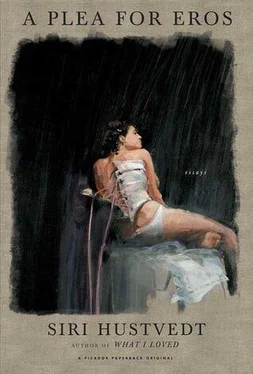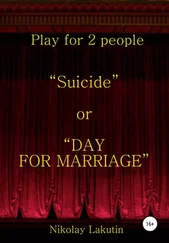Paul often says that it’s a strange life, this sitting alone in a room making up people and places, and that in the long run, nobody does it unless he has to. Years ago, he translated a French writer, Joseph Joubert, whose brief but startling journal entries have become part of our ongoing dialogue about art. Joubert wrote: “Those for whom the world is not enough: poets, philosophers and all lovers of books.” When I read Death on the Installment Plan in my early thirties, the book in which I imagined the hero in my grandparents’ house, I loved it so much I was sorry to finish it. I closed the book and shocked myself by thinking, This is better than life. I didn’t mean or want to think this, but I’m afraid I did. Certainly this feeling about a book is the one that makes people want to write. I don’t know why I feel more alive when I write, but I do. Maybe I imagine that if I scratch hard enough into the paper, I will last. Maybe the world isn’t enough, or maybe the distinction between the world and fiction is not so clear. Fiction is made from the stuff of the world, after all, which includes dreams and wishes and fantasies and memory. And it is never really made alone, but from the material between and among us: language. When Mikhail Bakhtin argues that the novel is dialogical — multivoiced, conflicted, in constant dialogue within itself — he is identifying all those jabbering voices every fiction writer hears in his or her head. Writing novels is a solitary act that is also plural, and its many voices are forever placing us somewhere — here or there or yonder. At the same time, writing collapses these spatial categories. Like a heartbeat or a breath, it marks the time of a living consciousness on the page, a consciousness that is present and here, but also absent. The page can resurrect what’s lost and what’s dead, what’s not there anymore and what was never there. Fiction is like the ghost twin of memory that moves through the myriad cities, landscapes, houses, and rooms of the mind.
1995
A FEW YEARS AGO A FRIEND OF MINE GAVE A LECTURE AT Berkeley on the fentme falaie, a subject he has been thinking about for years. When I met him, he was a graduate student at Columbia University, but now he is a full-fledged philosopher, and when it is finished, his book will be published by Galfimard in France and Harvard University Press in America. He is Belgian but lives in Paris, a detail significant to the story, because he comes from another rhetorical tradition — a French one. When he finished speaking, he took questions, including a hostile one from a woman who demanded to know what he thought of the Antioch Ruling — a law enacted at An-tioch College, which essentially made every stage of a sexual encounter on campus Legal only by verbal consent. My friend paused, smiled, and replied, “It’s wonderful. I love it. Just think of the erotic possibilities: ‘May I touch your right breast? May I touch your left breast?’“ The woman had nothing to say.
This little exchange has lingered in my mind. What interests me is that he and she were addressing exactly the same problem, the idea of permission, and yet their perspectives were so far apart that it was as if they were speaking different languages. The woman expected opposition, and when she didn’t get it, she was speechless. Aggressive questions are usually pedagogic — that is, the answer has already been written in the mind of the questioner, who then waits with a reply. It’s pretend listening. But by moving the story — in this case, the narrative of potential lovers — onto new ground, the young philosopher tripped up his opponent.
It is safe to assume that the Antioch Ruling wasn’t devised to increase sexual pleasure on campus, and yet the new barriers it made, ones that dissect both sexual gestures and the female body (the ruling came about to protect women, not men), have been the stuff of erotic fantasy for ages. When the troubadour pined for his lady, he hoped against hope that he would be granted a special favor — a kiss perhaps. The sonnet itself is a form that takes the body of the beloved apart — her hair, her eyes, her lips, her breasts. The body in pieces is reborn in this legal drama of spoken permission. Eroticism thrives both on borders and on distance. It is a commonplace that sexual pleasure demands thresholds. My philosopher made quick work of demonstrating the excitement of crossing into forbidden territory — the place you need special permission to trespass into. But there is distance here, too, a distance the earnest crusaders who invented the ruling couldn’t possibly have foreseen. The articulation of the other’s body in words turns it into a map of possible pleasure, effectively distancing that body by transforming it into an erotic object.
Objectification has a bad name in our culture. Cries of “Women are not sexual objects” have been resounding for years. I first ran into this argument in a volume I bought in the ninth grade called Sisterhood Is Powerful. I carried that book around with me until it fell apart. Feminism was good for me, as were any number of causes, but as I developed as a thinking person, the truisms and dogmas of every ideology became as worn as that book’s cover. Of course women are sexual objects; so are men. Even while I was hugging that book of feminist rhetoric to my chest, I groomed myself carefully, zipped myself into tight jeans, and went after the boy I wanted most, mentally picking apart desirable male bodies like a connoisseur. Erotic pleasure, derived from the most intimate physical contact, thrives on the paradox that only by keeping alive the strangeness of that other person can eroticism last. Every person is keenly aware of the fact that sexual feeling is distinct from affection, even though they often conspire, but this fact runs against the grain of classic feminist arguments.
American feminism has always had a puritanical strain, an imposed blindness to erotic truth. There is a hard, pragmatic aspect to this. It is impolitic to admit that sexual pleasure comes in all shapes and sizes, that women, like men, are often aroused by what seems silly at best and perverse at worst. And because sexual excitement always partakes of the culture itself, finds its images and triggers from the boundaries delineated in a given society, the whole subject is a messy business.
Several years ago I read an article in The New York Times about a Chinese version of the Kinsey Report, the results of which suggested that Chinese women as a group experienced no sexual pleasure. This struck me as insane, but as I began to ponder the idea, it took on a kind of sense. 1 visited China in 1986 to find a place still reeling from the Cultural Revolution, a place in which prerevolutionary forms appeared to have been utterly forgotten. Maybe there can’t be much erotic life, other than the barest minimum, without an encouraging culture — without movies and books, without ideas about what it’s supposed to be. When I was fifteen, I remember watching Carnal Knowledge at the Grand movie theater in Northfield, Minnesota, my hometown. Jack Nicholson and Ann-Margret were locked in a mystifying upright embrace and were crashing around the room with their clothes on, or most of them on, banging into walls and making a lot of noise, and I had absolutely no idea what they were doing. It had never occurred to me in my virginal state that people made love like that. A friend had to tell me what I was seeing. Most teenagers today are more sophisticated, but only because they’ve had more exposure. I was thirteen before I stumbled over the word rape —in Gone with the Wind. I walked downstairs and asked my mother what it meant. She looked at me and said, “I was afraid of that.” Then she told me. But even after I knew, I didn’t really understand it, and I couldn’t imagine it.
Читать дальше












